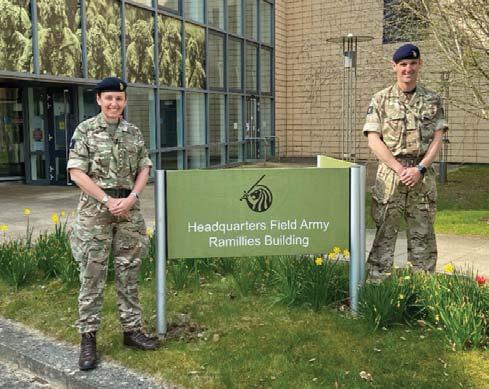
25 minute read
Working in HQ Fd Army
Opportunities for RLC WOs and SNCOs within HQ Field Army
Headquarters Field Army Headquarters Field Army is responsible for generating and preparing forces, for current and contingent operations. RLC WOs and SNCOs work within two elements of the HQ, Logistic Branch and the Land Operations Command. These departments have several posts, which are split into small teams of SMEs including: LSS, Drivers, Driver Tank Transporters, Pet Ops and Mov Cons. These teams routinely communicate with a variety of internal and external agencies. The Log Branch is headed up by DACOS Log who is an OF5. On 22 Apr 21, Col Ceri Morton handed over to Col James Rhodes.
The Army Transport Control Tower (ATCT) The ATCT (1 x WO2 and 2 x SNCO posts) is responsible for the monitoring, analysis and usage of the Field Army vehicle fleet, as well as costs incurred through commercial hire. Data is collected from white fleet hires, which is then scrutinised against MOD assets; this process is mirrored for heavy lift tasks. The ATCT uses the data captured to identify under-utilised MOD vehicles and make efficiency recommendations. Through a combination of policy or process changes, which maximise the use of military vehicles and minimise the use of hire or contract capability, the team reduces Field Army costs and maximises opportunities for competence and currency activity for Army personnel.
The Army Inventory Control Tower (AICT) AICT (1 x WO and 3 x SNCOs) provides HQ Fd Army with an in-depth supply analytics capability, focusing on procurement, supply chain and inventory management by scrutinising historic, current and future supply operations performance. This allows the team to simulate solutions to supply issues and implement various trials across the Army in an effort to achieve best value for Defence, through cost saving and behavioural change. To date, all AICT activities have influenced efficiencies on inventory worth circa £174M.
The Force Ordnance Warrant Officer (FOWO) team The FOWO and 1 x SSgt are the focal point for Field Army supply matters, providing advice and clarity on inventory management including Supply Chain Policy. They are the link with Army HQ for all supply related issues. More recently as the Field Army develops Land Componency, they have increased their operational focus. They were intimately involved in the planning and deployment of Op NEWCOMBE (LRRPTG) as well as assuming responsibility for previously PJHQ managed operations. They communicate with various agencies both military and civilian. Both posts are challenging but rewarding as they are lead supply SMEs within the Field Army.
The Heavy Lift Tasking Cell (HLTC) The HLTC (1 x Sgt and 1 x FTX employee) co-ordinates all heavy lift bids from across the Army. It acts as a staff-check to ensure bids are a legitimate use of public funds, ensures military transport is used first to ensure value for money and liaises between Field Army and DSCOM and identifies areas for improvement. The HLTC supports various exercises and operations for the wider MOD. Additionally, it supports bespoke defence activity such as Project CEDAR, which provided 100 RWMIK+ to the Lebanese Armed Forces.
Fuel Fuel is one of the commodities that HQ Fd Army manages and this is undertaken by one Pet Op SSgt. They oversee several fuel contracts, which support operations, enable training and support forces held at readiness for contingency. They also provide SME fuel advice into the Field Army, planning for operations and exercises and, when required, support Army HQ with assurance.
Movement control The Movements team works in the Land Operations Command (LOC) and they plan, direct and execute the deployment and recovery of personal and equipment on operations, exercises and other Defence activity for Field Army and the wider Army. Split into three geographical “pillars”, six WO/SNCO Movement Controllers conduct this vital Force Generation function and give SME advice to staff officers. They ensure operational success by applying the key movements principles to the detailed deployment plan. The team communicate with PJHQ, Divisional Formations and the Defence Support.
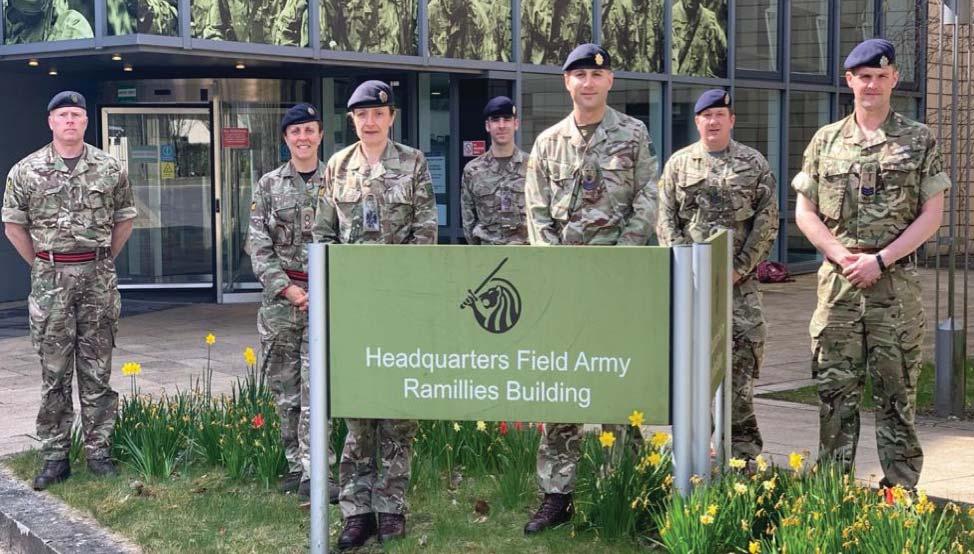
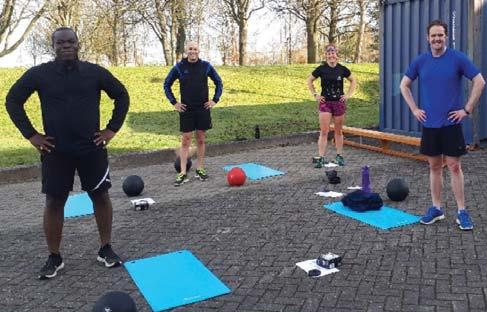
Operational facing opportunities So, if you’re interested in broadening your experience within a great team in an Ops-facing environment, and improving your promotion prospects, why not consider applying to serve within HQ Fd Army supporting those preparing to, and those already deployed, on ops.
Personal reflections on operating within HQ Fd Army My role in the ATCT involves collating data from multiple sources then developing and delivering more effective transport. Working in a staff environment is a great opportunity as it gives you the ability to understand what the Field Army undertakes, ranging from daily tasks to worldwide deployments. Working closely alongside other trades and cap badges has broadened my knowledge of logistics across Defence. I am currently doing a BSc in Defence Logistics which is fully supported by my CofC. Sgt James Bacon The HLTC is a busy and rewarding place to work, which has given me the opportunity to broaden my knowledge of the wider Field Army and how it operates. This position has not only helped develop my understanding of the wider Army but also enhanced my personal development. Sgt Leigh Hitchen
Coming from a regimental background, the experience I have gained at HQ Fd Army has been invaluable and has undoubtably enhanced my trade knowledge. This will not only benefit me, but additionally employers in future postings, helping me understand the bigger picture. SSgt Sam Garwood
Working in HQ Fd Army has been a steep learning curve, which has not only broadened my trade knowledge but also allowed me to understand the wider supply chain. I work with many stakeholders on a daily basis, which is a challenging but fulfilling. I am currently studying for and MSc in Defence Logistic Management, which will deepen my knowledge, skills and experience. SSgt Emmanuel Gayi
The Defence School of Logistics
Commandant: Col Colin Francis CBE
This edition of The Sustaineris the final time that the Defence School of Logistics (DSL) will feature in its current guise. From 16 April, DSL has been merging with elements of the Defence School of Policing and Administration to form the Defence School of Logistics and Administration (DSLA) under the leadership of Group Captain Leah Griffin RAF. The School will continue to be based predominantly at Worthy Down with important outstations in RAF Brize Norton, RAFC Cranwell, Aylesbury and Marchwood.
Throughout its history, the DSL has made a remarkable contribution to Defence, the Army and the Corps. Every year it trains circa ten thousand Tri-Service, Civil Service and International personnel across a huge range of Initial and Subsequent Trade Training; everything from basic Chef training to Supply Chain Management through to international leadership development and operational logistic planning. A truly rich plethora of outputs.
The DSLA has much to look forward to as we begin to emerge from the COVID pandemic; the exciting opportunities offered by the Integrated Review, supporting the RLC Strategy and remaining at the heart of the Corps' continuing professional development agenda, whilst assisting with the development of the Corps' new home in Worthy Down. Underpinning all of this is the school's people; our outstanding team of 350 military and civilian staff have moved mountains throughout the pandemic to ensure that training outputs are maintained. I am extremely proud of everything they have achieved during my tenure as the final Commandant of the DSL and am certain they will continue to deliver for Defence as part of the new DSLA. I wish them and their new Commandant every success. [Col Francis has left the Army.]
Command Wing, Chief Instructor – Lieutenant Colonel Andy Moss OBE RLC
As ever, the drive and commitment of our instructors has been exemplary and we look forward to reaping some of the rewards as society hopefully eases out of the pandemic. We say goodbye to two stalwarts of the Wing; Major Herby Herbert and Captain Danny Rumney - both have been first-class ambassadors for the Wing and we wish them all the best for the future.
Field Log 1
The RLC Troop Commanders’ Course has been training within the COVID-19 restrictions to continue to deliver subalterns ready to command RLC troops in the Field Army. Exercise TIMBER TRUSS, the highpoint of the course that brings all tactical, command and logistic training together, was fantastically well-supported by a number of
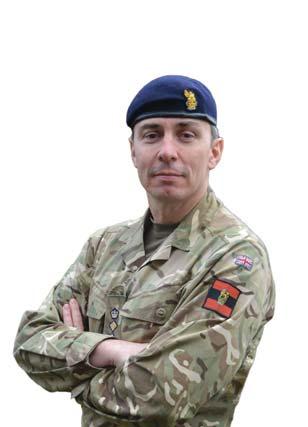
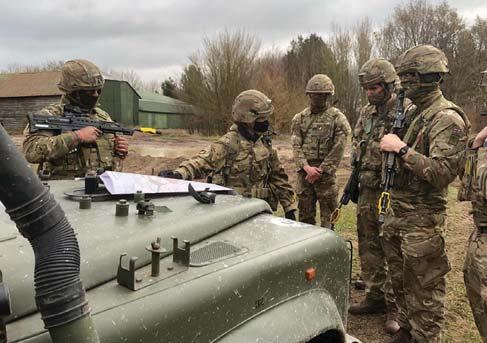
8 Troop Commanders on Exercise TIMBER TRUSS
units; 3 Regiment RLC, who in a huge win-win situation were able to meet a number of their Regimental training objectives whilst fulfilling the Support to Experimentation and Training (SET) task, 47 Air Despatch Squadron RLC who tied-in a number of their training serials with the exercise to show off their niche capability, the Defence College of Policing and Guarding (DCPG) who trained their personnel in traffic control points and 29 Regiment RLC trialling Automatic Number Plate Recognition (ANPR) technology. Exercise TIMBER TRUSS was therefore hugely successful in showing off what The RLC can do. Employing well-motivated captains as Directing Staff, each with one or more high-profile aspects of the course to manage (as well as leading their syndicates), is one of the tenets that keep the course progressive and interesting. The restructuring of the course, to expand the tactical command phase, is leading to further exciting opportunities for the students and DS alike.
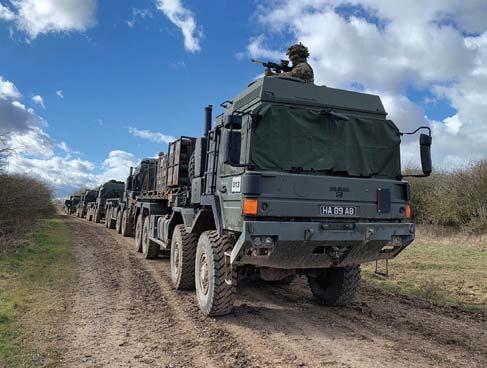
8 Exercise TIMBER TRUSS
Field Log 2
Since the last edition, Fd Log 2 has delivered two RLC Captains’ Courses and a virtual Defence Logistic Contract Management Course (DLCMC). These were well received and well attended by a host of stakeholders across Defence
which included PJHQ and HQ ARRC personnel amongst others. As with all areas of Command Wing, we have developed our delivery style to accommodate the various COVID-19 Force Health Protection Measures, which has led to a truly blended learning experience for our students.
As the current Training Year (TY) draws to conclusion, dates for the RLC Capts’ Cse TY 21/22 have now been confirmed, details of which have been circulated to all RLC Adjts. In summary: 21/001 – 10-21 May 21 21/002 – 13-24 Sep 21 21/003 – 17-28 Jan 22 21/004 – 14-25 Mar 22
Course loading and allocation is co-ordinated by APC: POC - Mr Paul Kent: @Kent, Paul Mr (APC-CSS-RLCOffrs-2-E1)
The Fd Log 2 team are also engaged in direct support of Task 3 of Objective 2 of the RLC Corps Strategy. We have supported the early Training Needs Analysis which is being conducted by LWC, with the aim of identifying the future contract management training requirements. There is much to do to ensure that any future course is contemporary, credible and relevant for the target audience. ‘Watch this space’ for future reports of progress.
Field Log 3
Field Log 3 has spent the first quarter of 2021 preparing to deliver the first Joint Logistic Operations Course since 2019. COVID-19 Force Health Protection measures will preclude the customary visit to Hungary for this course. The planning exercise in Hungary is a regular bilateral event that both develops an expeditionary mindset on the course and nourishes the nearly 30-year relationship between the Defence School of Logistics and the National University of Public Services in Budapest; we look forward to resuming that relationship when we can. Additionally, LogFAS (Logistic Functional Area Services) will be used as a planning tool during course delivery, providing students with the opportunity to experience its utility both in deployment planning and in allowing for collaborative work on generating a dynamic Force Element Table.
Further ahead, Fd Log 3 will look to build on last year’s highly successful RLC Majors’ Courses, ensuring the Corps’ newly promoted Majors are fully equipped for success at IG2. The difference this time around is that anticipating an update to the Corps Instruction H Series, all promoted LE Officers (and not just those who will attend ICSC(L)) have been invited to attend the course in order to give them the best possible start at IG2.
Additionally, Field Log 3 continues to deliver Comdt DCLPA's vision for RLC Strategy Objective 2. Having achieved our 2020 objectives, we have written the timeline against the remaining deliverables out to 2025 and we have engaged with thought leaders across Army and Defence. We will be running a series of ‘deep dive’ consultations across each trade group which will consolidate the collective knowledge of trade proponents and Heads of Trade, harvesting the expertise that already exists in the Corps to enable us to drive the technology-led, data-enabled transformation of the Corps. Most heartening has been the genuine offers of help from throughout the Corps following the RLC Strategy Cross-brief Zoom call on 25 February. Field Log 3 will be engaging with those enterprising RLC officers and soldiers in the coming months.
85 (HERRING VC) Sqn RLC
Successful delivery of Warr ant Officer Command Leadership and Management and both Cpl and Sgt Army Leadership Development Programme (ALDP) courses over the 2020 calendar year has resulted in full Statement of Training Requirement (SOTR) attainment. 85 Sqn DS have been steadfast in their pursuit of continued excellence and professionalism throughout, ensuring the Corps' leaders receive the best Leadership Development training available. Working 24/7 and every weekend resulted in completion of our SOTR three months earlier than forecasted; enabling a Personal and Professional Development concentration and thus ensuring our DS are nurtured and developed in the same way the Corps' leaders are.
Out with our core ALDP outputs, the vital ground of Instructor Development of RLC JNCO instructors, earmarked for instructor appointments at Ph 1, 2 and 3 establishments, continues at pace. The pinnacle of instructor prowess remains within the Royal Military Academy Sandhurst (RMAS) preparation cycle, which witnessed our very own Sgt Louisa Steer being selected for employment across a Pan-Army cohort.
If you possess instructional talent at Unit Lines (Pte-Sgt), please engage with the following POCs: • The Instructor Cadre Briefing Course delivered by
RMAS twice a year, loaded by Karen Hampton, (APC-CMOps-MS7-1E1) Karen.Hampton924@mod.gov.uk as detailed within Corps Instruction H15. • The RLC Instructor Development Cadre (IDC) delivered three times a year (Sep, Oct and Nov) by 85 Sqn from
Worthy Down (WD), as detailed within Corps Instruction
H14. PoC is 85 Sqn 2IC: Rory.Falls233@mod.gov.uk
Food Services Training Wing Commanding Officer –Commander Gary Manning RN
Gurkha Defence Chef Basic
The Ghurkha Defence Chef Basic (DCB) course have recently completed the specialist cookery phase of the course, which consists of a three-week introduction to Nepalese cooking methods. The Gurkhas’ pathway to becoming Chefs is much longer than that of their RLC counter parts. Prior to arriving at FSTW, Queen’s Own Gurkha Logistic Regiment (QOGLR) trainees undergo the full Infantry training course at the Infantry Training Centre in Catterick, as well as undergoing unit induction at 10 QOGLR. Upon arrival at FSTW, the trainees complete the DCB course prior to commencing the Gurkha cookery phase. Under the careful tutelage of Sgt Mukesh Rai (QOGLR) and Sgt Kuman Limbu (RLC), the trainees have learnt the key fundamentals of Nepalese cookery which has provided them with the knowledge and practical skills to deliver first class service to Gurkha units across Defence.
Army Apprenticeship team (Chefs)
The Chef Apprenticeship team has been burning the midnight oil developing the Level 3 Facilities Management (FM) Apprenticeship for our SNCO chefs. The FM Apprenticeship was approved for delivery by the Army in late 2020 and has been rolled out to our Army Chefs. The first cohort was inducted during the recent Unit Catering Managers’ Course in January, with all those involved working hard to complete their E-Portfolios and attending
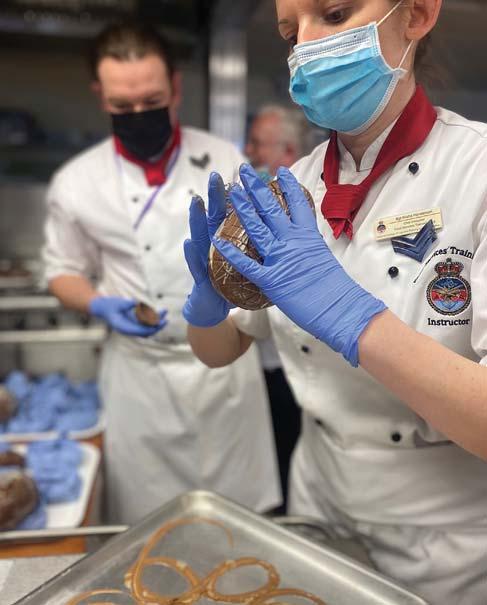
8 FSTW Easter Eggs FM masterclasses. The team, realising that there would be some SNCO Chefs who would miss out on this opportunity having already attended their UCM course, quickly highlighted the excellent opportunity via the Army-Food Services “Teams” Page with personnel in units jumping at the chance for personal development. Cohort 2 will begin in April, with a third cohort planned in July.
Logistic Specialist Training Wing, Commanding Officer – Wing Commander Liz Corry RAF
Defence Petroleum and Specialist Training Squadron (DPSTS)
For many years West Moors was the home of the Petroleum Operator, but times have moved on and the Defence Petroleum Training Squadron has integrated into DPSTS at Worthy Down. The Squadron has grown and now combines RLC Trade and Defence Fuels, RAF Fuels, Defence and RAF Dangerous Goods, Health & Safety, Postal & Courier and Equipment Repair and Tailoring. Petroleum Operator training is now conducted within Worthy Down and Defence training areas.
Significant construction of fuel bunds to support the Joint Operational Fuel System (JOFS) has enabled the Sqn and Defence to train more realistically, with a wider geographical footprint of training areas to use. These areas are a fantastic working environment for teaching and testing the range of skills required of Petroleum Operators and embracing conditions that trainees and field force will encounter in their future assignments. To further support training, Army HQ has secured 100,000 litres of F-54 held at readiness on an issue and return basis. This fuel has been made available for DPSTS training and wider fuel training within Defence at no cost so long as the fuel is returned to West Moors Depot at A1 specification. This fuel delivers an opportunity to increase the volume used for training and develop training under realistic conditions from the commission and testing phase through to issue and receipt operations. In addition, it provides greater training for the Petroleum Laboratory Technicians to conduct quality assurance utilising the Portable Petroleum Testing Kit (PPTK). The PPTK is a deployable fuel testing lab with the capability of conducting rapid fuel sampling, testing, analysis and reporting to assure quality specifications are met before fuel receipts and issue and on return of the training stock to the Depot.
RLC Trade Training is also under development to integrate Regular and Reserve training into one course. Reservists are an integral component of the UK Defence capability and as part of the Whole Force approach, they fulfil the same job role as a Regular Petroleum Operator when deployed. One course for all will ensure that the same teaching objectives are taught to Regular and Reservists and to the same standard.
Defence Movements Training Squadron (DMTS)
Over the last year, the DMTS has been adapting their ways of working; the demands of COVID unfortunately reduced the delivery capacity of the Sqn. However, the reduction of delivery capacity has spurred on the Sqn’s Technology Enhanced Learning (TEL) drive, spearheaded by the Sqn’s Training WO. This has been done using a mixture of platforms including: Microsoft Teams, Zoom, Defence Connect, Evolve and Padlet to name a few.
The first course delivered remotely at the DMTS was the Unit Deployment Officer Course in Apr 20, with nine students taking part in the pilot. This allowed students who were at home during the lockdown to attend as well as increasing the capacity of classes. Over the last ten months, the DMTS has run a further four iterations of this course with up to 16 students attending at one time. They conduct the virtual face to face lessons over Zoom with access to essential course documentation through Evolve. They are then given assignments and research projects that simulate a real-life deployment process and submit them to the trainer in the same way they would submit the finished products in the real world. By delivering the course in this method, it has allowed students to work at their own speed, afforded a better work-life balance and still seen completion within the course timelines. Not all personnel have the ability to study in this manner, therefore the DMTS has also simultaneously delivered a combination of face to face and remote delivery.
The Army Delivery training team has extended this TEL drive out to pilot delivery on several other courses such as
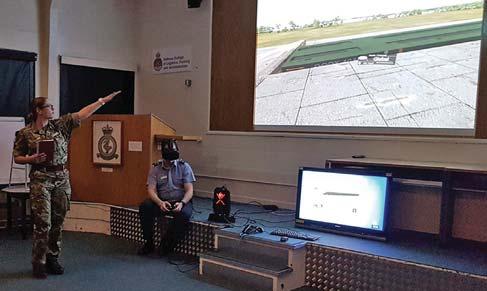
8 DMTS VR training
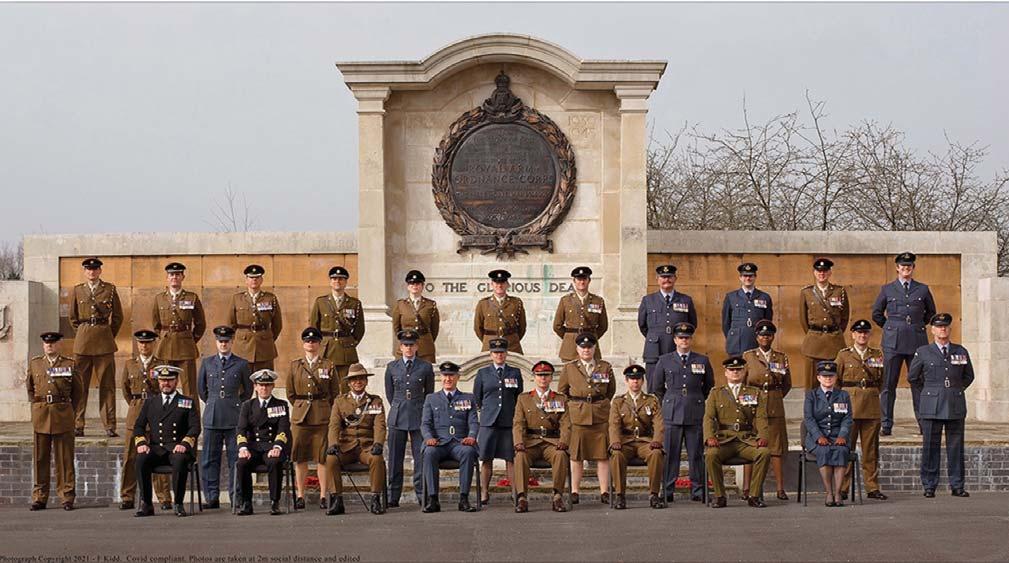
the Movement Controller WO (MCWO) course, the Movement Control Officers’ Course, elements of the Movement Controller Class 1 and Government Authorised Explosive Representative courses. The most successful of these was the MCWO course allowing a student to join the course from BATUS without having to travel and isolate for four weeks.
Looking to the future, the DMTS is now actively working on incorporating VR technology into our training serials. Already used on our RAF courses for aircraft safety briefs and loading activities, the development of the rail loading package is underway to aid trainers in the delivery of the Rail Loading Supervisors’ course.
Supply Training Wing, Chief Instructor – Lieutenant Colonel Devendra Ale MVO MBE QOGLR
The Supply Training Wing returned from Christmas leave into lockdown three and the knowledge that COVID restrictions would be in place for the foreseeable future. The five divisions within STW (Royal Navy Division, Engineer Logistics Division, All Arms Division, Supply Chain Division and Royal Air Force Division) immediately resumed delivery of their single Service courses at pace. The COVID restrictions have taken a significant toll on course delivery due to the reduction of classroom sizes to nine trainees for STT and 12 trainees for ITT. Both the All Arms Div and SCD courses have had to be reduced in length in order to conform to Force Health Protection measures which has led to the introduction of new and innovative ways of delivering training. SCD have continued to deliver 80% of their course portfolio virtually through distance and pre-course learning packages which has resulted in only one third of the course delivered in Worthy Down and the remainder non-residential with the trainers providing online support. In March, SCD also ran the Ordnance Warrant Officer Course completely virtually using Microsoft Teams which resulted in sixteen LSS Warrant Officers receiving the full package from both trainers and guest lecturers from different locations.
Although the lockdown has continued to prevent the staff from conducting social gatherings, we have found other ways to bring the Divs together by conducting combined Continuous Professional Development activities through Teams. Each Division was tasked with preparing and delivering a CPD event on their respective single Service or cap badge. A number of interesting topics have been presented from Petty Officers Jack Hawkins and LSC Amanda Christopher delivering a presentation on the Royal Navy’s fleet capability to Cpls Parrott and Turner providing an insight into the structure of the RAF and RAF Logistics. SSgt Atkins and Sgt Haverty provided a brief on the Virtual Learning Environment being developed by SCD to make some of their courses more interactive and WO2 Higgins from Engineer Logistics Division delivered a presentation on the Defence Systems Approach to Training (DSAT), something which affects us all. These presentations have afforded us all the opportunity to understand and appreciate what our single Service colleagues do.
8 Officers of DSL
A DEGREE? ME? NEVER!
By WO1 (RSM) Mark Banks
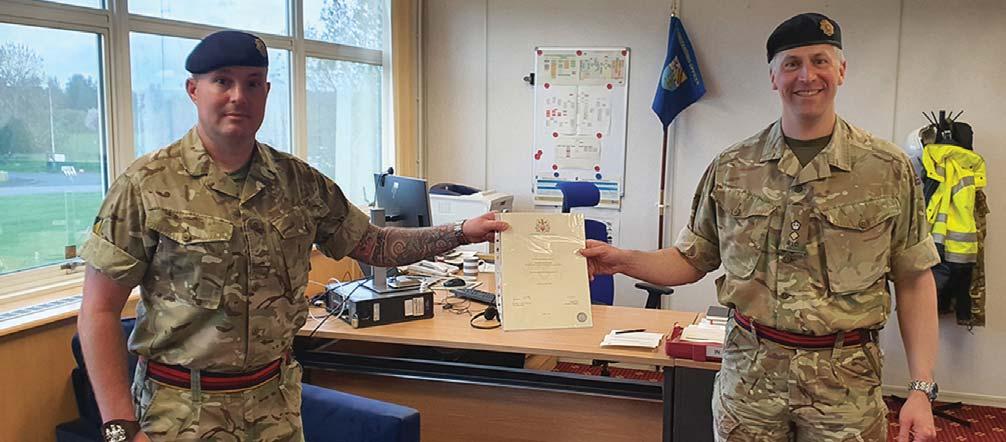
In 2016, I attended the Warrant Officer Command Leadership Management Part 3 course. During the course, an instructor outlined that successful completion would make us eligible to attend degree level training with Northumbria University. This further training meant applicants would embark on a Leadership and Management BA (Hons) Degree and I remember thinking it was something I might be interested in but genuinely thought it would be beyond my academic reach - after all, I am a soldier, not an academic! Fast forward to 2019 and after much procrastination, I decided to enrol.
Like most, I was apprehensive about the likely financial outlay required to complete such a course but my (then) OC informed me of additional financial support that can be allocated from a central Corps fund. Some swift research placed me in contact with the Corps’ Regimental Treasurer who outlined the process to me and by completing a simple form, I was allocated £800 on top of my Enhanced Learning Credits (ELCs), reducing my personal contribution to £1,000 instead of the full course fee of £3,800.
After enrolling, I attended an open day at the university which provided me with the chance to meet fellow students and to complete some very light ice breakers. It became clear from the outset who were fellow military students as we were all slightly more mature than the other attendees. At one point, another student asked me a campus related question as he had assumed that I was a lecturer! In true military style, I quickly recognised an old acquaintance (Jez) and we immediately bonded; our shared experience, drive and desire to succeed meant we immediately made a pact to work together and support each other when required. This proved invaluable when discussing ideas and topics for assignments.
The University Leadership Team provided us with regular updates on what to expect in the coming weeks and also a handrail for how best to tackle them. I admit to being overwhelmed on occasions and daunted by the workload. That said, when each assignment was outlined, I was immediately able to relate it to my career and past experiences which made completing it far more manageable.
Having a close course associate in Jez was instrumental in my success; regular phone calls to discuss ideas, overcome confusion and benchmark output were productive. Staff checking each other’s work was also key given the fact that grammar and spelling inaccuracies can cost you as much as 10% of an assignment. The training and experience added huge value to our individual development portfolios which will be just as relevant when we retire from the Service and embark on second careers.
So, you may be asking why this is relevant. The truth is, whilst the course is nearly all theory, much of it is relatable to what each of us has achieved in reaching Warrant rank. Many students on the course had spent in excess of £11,000 to obtain this degree and the majority had little to no experience in leadership and management or access to colleagues who could coach them. By virtue of our rank structure, relevant responsibilities, world-class training and network of experienced colleagues, as Warrant Officers, we are able to relate to the subject and apply practical experience to every situation. This is an opportunity
8 WO1 (RSM) M Banks RLC (left)
receiving his degree certificate from DM Kineton CO Lt Col D Pickersgill RLC
that is financially palatable given the £1,000 personal contribution, relatable and manageable given our growth and experience, and challenging and rewarding in equal measure with a degree qualification to boot at the end.
Do not be phased by the academic requirements of such a training course; the initial anxieties are quickly swept aside when you start the training and apply your experience. This is not out of the reach of any Warrant Officer. I grew in confidence with every assignment and relished the challenge of the next – this could be you. 8 If you or anyone is interested in finding out more detail about this course, please don’t hesitate to get in touch with WO1 (RSM) M Banks on: 94248 3439.

WO1 Banks’ guide to applying for a Degree in Leadership and Management with Northumbria University
8 First steps Speak to the university to see which year you can be put into based on your qualifications (I was informed that the CMI Level 6 Diploma in Leadership and Management would put me straight into Year 3). You can then apply for your diploma via the Army Skills Offer: https://modgovuk.sharepoint.com /sites/defnet/Corp/Army/Publicati ons/ACO_2019_04.pdf#search= aco%202019%2F04
8 Enhanced Learning Credits Contact your local Education Centre to ensure that you are entitled to the Enhanced Learning Credits. When I spoke to the Local Education Centre, they confirmed that I was entitled to £2,000 per year for training.
8 Apply to the University Using the university website (https://www.northumbria.ac.uk/), you can then apply to enrol onto the Leadership and Management Degree Course.
I was asked at this stage to provide evidence of my CMI Level 6 Diploma. I stated that I had recently applied for it and that as soon as I received it, I would upload the document. Once I received the diploma, I emailed it to the university and within a couple of days things started to happen (it would seem that this qualification is absolutely necessary when applying for the course and if I was reapplying, I would have done this first).
8 Stage 4 - Funding Wait to receive an email from the university confirming your place on the course (approximately seven weeks). This confirmation can then be used to apply for your Enhanced Learning Credit (ELC) grant. I logged into the ELC page and followed the guide to applying for ELCs. The total cost for the course came in at £3,800. This meant that with my grant of £2,000, I would pay £1,800 towards the fees.
Using the email confirmation from the university, you can also apply for a grant from The RLC using the contacts below:
Harrison Tawiah (RLC RHQ-RegtTreasurer-FinAdminB) Harrison.Tawiah100@mod.gov.uk
Lt Col (Retd) Ian Stark (RLC RHQ-RegtTreasurer-SO2) Ian.Stark101@mod.gov.uk
Prior to applying for the funding, I called Lt Col Stark who explained what I needed to do. Essentially, I needed to write a brief email to Harrison Tawiah with a breakdown of my current costs. Within a couple of days, I received an application form and shortly after sending it back, I received an email stating that The RLC Association would grant me a sum of £800 to be paid in two instalments directly into my personal bank account. The total cost to me was now only £1,000.
8 Wait out Wait for the university to contact you with regards to your Induction Day. During the day, you will go over the course outline and meet others who will be on the course with you.
8 Additional information The university will likely provide you with a suggested reading list. A useful source for the necessary books is the Army Library Information System which can be accessed via Armynet.










